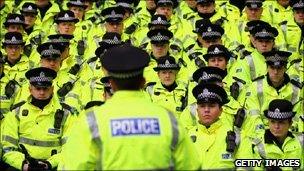Police face 'big challenge' to safeguard front line
- Published

The government says front-line police can be protected
Some police forces in England and Wales face a "big challenge" to make cuts and not lose front-line officers, the chief inspector of constabulary has warned.
Sir Denis O'Connor said two thirds of officers were directly involved in protecting the public and enforcing the law - although not all were visible.
Police are losing a fifth of their central funding over four years.
The government says this is manageable with greater front-line productivity and savings in back and middle offices.
The report by Her Majesty's Inspectorate of Constabulary (HMIC) sets out for the first time a definition of what constitutes front-line policing, amid a growing political debate about how chief constables should make cuts.
In the report, the HMIC says the front line comprises those who are "in everyday contact with the public and who directly intervene to keep people safe and enforce the law".
It found that 68% of all police force staff in England and Wales were in such roles, but not all were visible.
The HMIC estimates that 61% of police officers and community support officers (PCSOs) work in visible front-line positions, and of those 12% on average are available to the public at any given time.
Sir Denis said: "In a nutshell it looks difficult for the front line to remain in its current form in a number of forces."
The front line was "not just what you notice, but what you also rely on", he said.
"Even if you imagine that the back office and middle office are ripe for reform… there are quite a lot of functions in the back and middle office that you cannot see as being redundant… and so [cutting] looks like a very big challenge to us."
Sir Denis said middle and back office roles were not "disposable assets that you can chuck away" and losing some of those posts would have consequences for front-line officers.
He added: "The cuts across England and Wales do not cut in the same way by force. For some it's a much bigger challenge."
But he said there were still parts of policing operations that could be made more efficient and that there was wide variation in visible and available police officers among the 43 forces.
'Wrong choice'
Steve Finnigan, from the Association of Chief Police Officers, said: "One of the reasons why Sir Denis O'Connor has tried to agree a definition of 'front line' here is, of course, because in these times of austerity we will want to do everything we possibly can to protect the front line.
"He talked about that's going to prove really challenging - I would go further and say it's actually going to be impossible to protect, absolutely protect the front line. We'll do all that we can to minimise the impact on the front line, but when 85% of your budget is made up of people that's just not going to be possible."
Yvette Cooper: "We cannot make 20% cuts... without hitting front-line services"
In the House of Commons on Wednesday, Labour leader Ed Miliband said Prime Minister David Cameron "used to claim that [the Conservatives] were the party of law and order but now he is cutting the number of police officers up and down the country".
"It's the wrong choice for the police. It's the wrong choice for communities. And it's the wrong choice for the country," he said during Prime Minister's Questions.
Mr Cameron responded: "There is no reason why there should be fewer front-line officers.
"Both parties agree that the police budget has to be cut," he said. "The question is, how do you make those cuts? We say you've got to freeze police pay for two years; you've got to reform police allowances; you've got to cut their paperwork."
'Considerable savings'
Earlier, Police Minister Nick Herbert said: "This is not a numbers game. We cannot measure the quality of service just by the numbers - but what they are doing.
"This is about driving savings in the back and middle office... but it's also about driving up productivity in the front line itself.
"It's not just about the numbers - it's about the efficiency and how police forces organise themselves."
He said the government would continue to support forces by scrapping bureaucracy and driving more efficient procurement.
But shadow home secretary Yvette Cooper said: "The government is putting chief constables in an impossible position.
"Today's HMIC report shows that 95% of police officers are either on the front line or working in important 'middle office' jobs in things like intelligence, planning major operations, burglary and drugs offences, or preparing cases for court.
"Cutting over 12,000 police officers and 15,000 police staff is inevitably hitting the front line. The home secretary needs to change course. She is cutting too far, too fast and it is local communities that will pay the price."
- Published30 March 2011
- Published30 March 2011
- Published29 March 2011
- Published10 March 2011